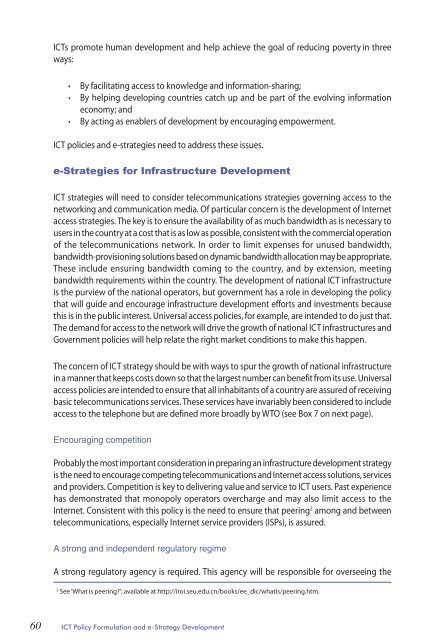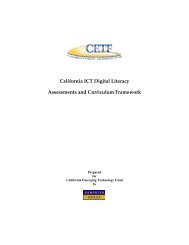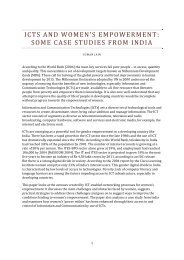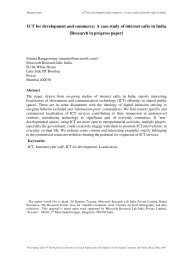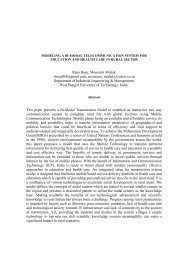ICT Policy Formulation and e-Strategy Development: A ... - un-apcict
ICT Policy Formulation and e-Strategy Development: A ... - un-apcict
ICT Policy Formulation and e-Strategy Development: A ... - un-apcict
You also want an ePaper? Increase the reach of your titles
YUMPU automatically turns print PDFs into web optimized ePapers that Google loves.
<strong>ICT</strong>s promote human development <strong>and</strong> help achieve the goal of reducing poverty in three<br />
ways:<br />
· By facilitating access to knowledge <strong>and</strong> information-sharing;<br />
· By helping developing co<strong>un</strong>tries catch up <strong>and</strong> be part of the evolving information<br />
economy; <strong>and</strong><br />
· By acting as enablers of development by encouraging empowerment.<br />
<strong>ICT</strong> policies <strong>and</strong> e-strategies need to address these issues.<br />
e-Strategies for Infrastructure <strong>Development</strong><br />
<strong>ICT</strong> strategies will need to consider telecomm<strong>un</strong>ications strategies governing access to the<br />
networking <strong>and</strong> comm<strong>un</strong>ication media. Of particular concern is the development of Internet<br />
access strategies. The key is to ensure the availability of as much b<strong>and</strong>width as is necessary to<br />
users in the co<strong>un</strong>try at a cost that is as low as possible, consistent with the commercial operation<br />
of the telecomm<strong>un</strong>ications network. In order to limit expenses for <strong>un</strong>used b<strong>and</strong>width,<br />
b<strong>and</strong>width-provisioning solutions based on dynamic b<strong>and</strong>width allocation may be appropriate.<br />
These include ensuring b<strong>and</strong>width coming to the co<strong>un</strong>try, <strong>and</strong> by extension, meeting<br />
b<strong>and</strong>width requirements within the co<strong>un</strong>try. The development of national <strong>ICT</strong> infrastructure<br />
is the purview of the national operators, but government has a role in developing the policy<br />
that will guide <strong>and</strong> encourage infrastructure development efforts <strong>and</strong> investments because<br />
this is in the public interest. Universal access policies, for example, are intended to do just that.<br />
The dem<strong>and</strong> for access to the network will drive the growth of national <strong>ICT</strong> infrastructures <strong>and</strong><br />
Government policies will help relate the right market conditions to make this happen.<br />
The concern of <strong>ICT</strong> strategy should be with ways to spur the growth of national infrastructure<br />
in a manner that keeps costs down so that the largest number can benefit from its use. Universal<br />
access policies are intended to ensure that all inhabitants of a co<strong>un</strong>try are assured of receiving<br />
basic telecomm<strong>un</strong>ications services. These services have invariably been considered to include<br />
access to the telephone but are defined more broadly by WTO (see Box 7 on next page).<br />
Encouraging competition<br />
Probably the most important consideration in preparing an infrastructure development strategy<br />
is the need to encourage competing telecomm<strong>un</strong>ications <strong>and</strong> Internet access solutions, services<br />
<strong>and</strong> providers. Competition is key to delivering value <strong>and</strong> service to <strong>ICT</strong> users. Past experience<br />
has demonstrated that monopoly operators overcharge <strong>and</strong> may also limit access to the<br />
Internet. Consistent with this policy is the need to ensure that peering 2 among <strong>and</strong> between<br />
telecomm<strong>un</strong>ications, especially Internet service providers (ISPs), is assured.<br />
A strong <strong>and</strong> independent regulatory regime<br />
A strong regulatory agency is required. This agency will be responsible for overseeing the<br />
2<br />
See ‘What is peering?’; available at http://iroi.seu.edu.cn/books/ee_dic/whatis/peering.htm.<br />
60<br />
<strong>ICT</strong> <strong>Policy</strong> <strong>Formulation</strong> <strong>and</strong> e-<strong>Strategy</strong> <strong>Development</strong>


